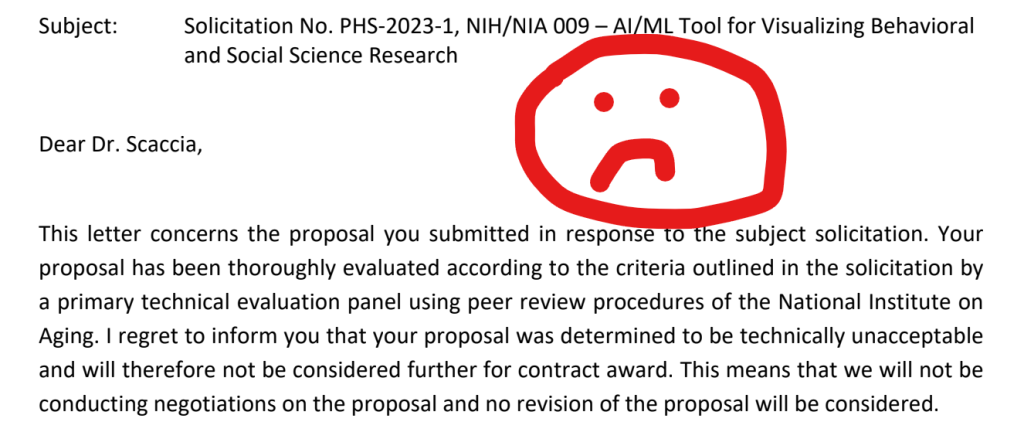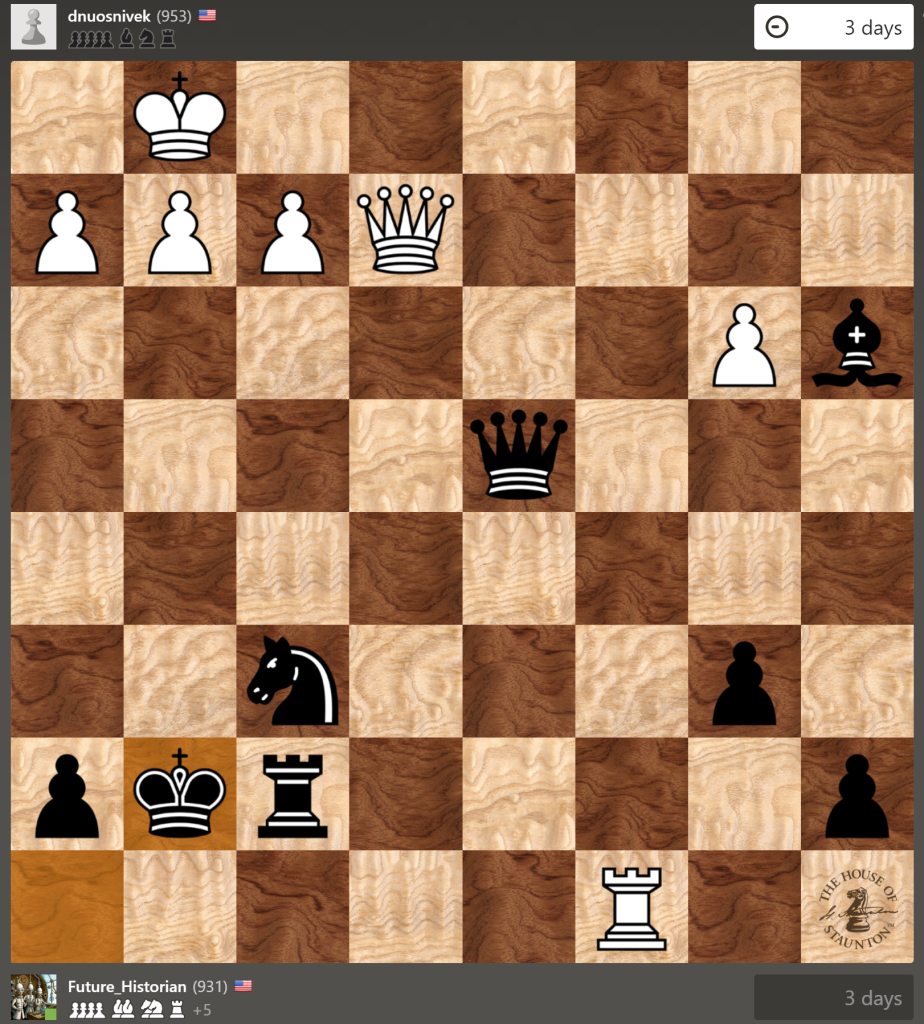Welcome aboard! Get ready to explore the fascinating world where game theory and proposal responses intersect. In this blog series, we’ll examine how these two seemingly different fields are connected and how game theory can add value to the proposal response process.
In our first blog post, we’ll start with an overview of game theory and then dive into the ins and outs of the proposal response process. Along the way, we’ll show you where these two areas come together, offering valuable insights that can make a real difference.
No need for fancy words or over-the-top excitement; we’re here to provide practical and engaging content that will enhance your understanding of the subject. Let’s embark on this journey together and discover the power of game theory in crafting winning proposal responses!
Why We Wrote This
In October of 2022, I dedicated countless hours to creating a proposal for a US Federal Organization. I was really, really confident about our chances. We had even built a working prototype of the product they were looking for. I assembled an exceptional team of computer scientists from a top computer science department in the country. We also had support from a leading non-profit organization focusing on research in this field. To ensure everything was perfect, I hired a grant writer to ensure all the details were in place.
I couldn’t help but imagine how this grant could completely transform our company’s future. I did my best to measure my expectations but couldn’t get the thought out of my head, “We are going to get this…..”
And we didn’t. It was more than a disappointment; I was crushed.

Maybe it was just bad luck, or our proposal had some unnoticed flaws. As I write this, we are still months away from receiving feedback on why we failed.
So, what do recovering academics do when faced with adversity? We read, overthink, and strategize!
Understanding Game Theory
Game theory, in its simplest form, is a mathematical model that studies strategic interactions, i.e., situations where the outcome for an individual depends not just on their own decisions but also on the decisions made by others. The ‘game’ in game theory refers not to fun and leisure but to any scenario where multiple players interact. These ‘players’ can be individuals, groups, or even nations, and the ‘games’ can be anything from a friendly chess match to complex economic negotiations.
There are several key principles within game theory.
The Nash Equilibrium

First up is the Nash Equilibrium, named after mathematician John Nash (from A Beautiful Mind fame). Imagine you’re playing a game with some friends. In this game, everyone has their own strategy, like a plan they follow to try and win. The Nash Equilibrium is a special situation where nobody can do better by changing their strategy as long as everyone else keeps playing the same way.
Let’s say you’re playing a game where you can cooperate or compete with your friends. If everyone cooperates, you’re all working together towards a common goal. In the Nash Equilibrium, if you decide to change and start competing instead, you wouldn’t gain any advantage because everyone else is still cooperating. The same goes for the others. If someone changes their strategy, they won’t improve their situation unless everyone else changes too.
Think of it like this. We might be able to remember the days of group projects in school. If everyone does their fair share of work, it’s the Nash Equilibrium. If someone suddenly decides to slack off and not contribute, they won’t benefit because everyone else is still doing their part. And if multiple people start slacking off, the project won’t turn out well for anyone.
The Nash Equilibrium is all about finding a balance where no one can gain an advantage by acting alone. It helps us understand how people make decisions in games and other situations where their choices affect others.
Dominant and Dominated Strategies

Another important concept in game theory is called dominant and dominated strategies. It’s like figuring out the best and worst moves in a game, no matter what the other players do.
Imagine playing a game with friends, each with different strategies. A dominant strategy is the one that gives you the best outcome, no matter what the others do. It’s like the superpower move that always works in your favor.
On the other hand, a dominated strategy is the opposite. It’s the move you should never choose because it always leads to a worse outcome, regardless of what the other players do. It’s like a trap that you want to avoid falling into.
Let’s say you’re playing a game where you can attack or defend. You realize that attacking always gives you the best result, no matter what the other players choose. So, attacking becomes your dominant strategy because it’s the smartest move for you to make.
Now, let’s think about a dominated strategy. In the same game, you notice that defending always leads to a worse outcome for you, no matter what the other players do. So, defending becomes your dominated strategy because it’s the worst move you can make.
Knowing the dominant and dominated strategies helps you make better decisions in games. It’s like having a cheat sheet to determine which moves are best and which you should avoid. By understanding these concepts, you can improve your chances of winning and outsmarting your opponents.
The Proposal Response Process
The proposal response process often kicks into gear when an organization decides to apply for a grant or respond to a Request for Proposals (RFP). This process involves understanding the grant or RFP’s requirements, conducting an internal assessment to determine the feasibility of meeting these requirements, developing a proposal compellingly addressing these requirements, and often negotiating terms if the proposal is accepted.
This process is rarely simple. It requires a deep understanding of one’s own capabilities, knowledge of the market landscape, insight into the needs and wants of the grant or RFP issuer, and the ability to articulate a compelling narrative that positions one’s organization as the ideal choice.
The Intersection of Game Theory and Proposal Responses
Now, you might be wondering: where does game theory come into this? The answer lies in the inherent strategic interaction within the proposal response process.
First, the decision to bid or not on a grant or RFP opportunity is a strategic decision that involves considering not only one’s capabilities but also the potential actions of competitors. Will they bid? What will they offer? Can we outperform them?
Second, when developing a proposal, an organization must again consider its competitors. How might they structure their proposals? What strategies might they use to appear more appealing?
Last, in the event of a successful proposal, negotiations often occur, and these, too, are strategic interactions where both parties try to secure the most beneficial outcome.
By viewing the proposal response process through game theory, organizations can better understand the strategic landscape, allowing them to make more informed decisions, develop more competitive proposals, and negotiate more effectively.
Real-World Examples
Game theory has already been successfully applied in numerous fields. In economics, it’s used to understand market competition and devise bidding strategies in auctions. In politics, game theory can help predict the outcome of elections based on the strategies of political parties. And in computer science, it’s used in the design of algorithms for resource allocation.
Similarly, the principles of game theory can also be used in proposal responses. For instance, understanding the Nash equilibrium can help organizations determine their best course of action given the expected actions of their competitors. Insights into dominant strategies can guide an organization in formulating its proposal, and understanding cooperative game theory can inform successful negotiation strategies.
In our upcoming blog posts, we will delve deeper into these topics, exploring in more detail how the principles of game theory can be applied throughout the proposal response process. We hope you’ll join us in this fascinating world where game theory meets proposal responses!
Next Week!
We look at how to use game theory to decide whether or not to bid on a proposal!

